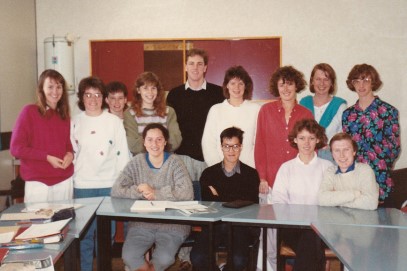Chalkeyes presents Slack times
Set wide the window. Let me drink the day.
At the end of the last column I was standing on a scaffolding five metres from the ground, getting a fresh coat of paint onto the roof and taking care to not break my neck.
This all went according to plan, save for one patch of roof that I couldn't reach with my $450 TradeMe scaffolding kit. I was loath, having got so far on $450, to now spend thousands on professionals just to get to the last few sheets of iron. So, I spent three months looking for alternatives.
The problem was that I needed to somehow clamber over a large section of conservatory glass that had not been made for stepping on. Architects, man! They don't always contemplate the hapless future owner trying to do some DIY.
I asked glaziers. Three different ones. They all said, “No mate, you’ll need scaffolding.” I asked plumbers - there was also some rusted spouting to be replaced, I had discovered, that sat above the 10 unwalkable panes of glass – but they said the same thing.
So, months came and months went and I rigged up planks and platforms to try to clamber over the glass and managed to crack one pane, and I really didn't know what to do next.
But then the cavalry arrived: two guys from Kiwi Double Glazing. Reader, I mention them by name because as you will see, they impressed me greatly and brought me deliverance.
We walked through the house discussing all the double glazing we'd like to retrofit. We came to the ten panes of unwalkable glass and I described my problem and one of them said, “Oh that's easy – sandbags!”
This was the cartoon moment where your hapless character slaps his forehead. Sandbags! Of course! The crux of the problem was that I couldn’t find anywhere up there to stand. But wedge a sandbag between the lip of the glass and the roof below? It creates a platform you can walk on with ease. And with a few sandbags stacked on the planks below, suddenly you have the means to easily hoist yourself up and over the windows onto the roof.
Just like that, I was off to the races. I hauled sandbags onto the roof, set them all in place, ripped off the rotten spouting and painted all the remaining corrugated iron with a song in my heart. I thought: “Isn't it amazing how the right person with the right idea and a few simple words can solve a problem that had you stymied for months.”
I find that with computer coding too. You can look for hours at a piece of code that won’t work and step through the logic item by item and get nowhere. Then you show it to someone with an abundance of capability and they say, “Oh there, there's your problem.” And it may be as simple as two or three characters, but it fixes everything.
The more people you know and talk to, the more you learn. But that’s not the direction social media is taking us in. Facebook puts us into silos of like-minded friends, where we reinforce opinions we hold and facts we already think we know. Working across boundaries is good. You learn new and valuable things.
I recall Michael Cullen suggesting that number-8-wire-thinking could be an impediment to our success in the 21st century. I think what he meant by that, was this: the clever resourceful Kiwi working alone in the shed is not a model for success in the modern high-tech world.
Today, so many things are connected to so very many others. The high-tech equipment you use probably represents a fusion of skills and capital that spans a precision technology plant in Germany, a design studio in California and a processing capability in China, and perhaps dozens of different entities in between supplying some element that goes into the finished product.
I wonder if here, in New Zealand, we still have plenty of sandbag-number-8-wire ingenuity and a lot of work to do connecting to new and other ways of doing things?
We face a future where meat is made in labs; where no matter how much milk powder you produce, it will never be enough to pay for the technology that more sophisticated economies are producing.
Working across boundaries, in spite of their social media obsession, this is what I see my daughter’s young generation doing. They connect, they collaborate and it opens doors for them, and boy, do they ever need it in an age of evaporating certainties of work. That looks like the best way to operate in the 21st century to me!
We are as inventive and as hardworking as anybody anywhere. But if we keep to our familiar track and stay in our silos, the window of opportunity will be forever out of our reach.
David Slack is an author, radio and TV commentator and speechwriter. He established the website speeches.com, and has published several books including ‘Bullshit, Backlash and Bleeding Hearts’, exploring Treaty of Waitangi issues, and ‘Bullrush’, a social history of the popular children’s game.



























